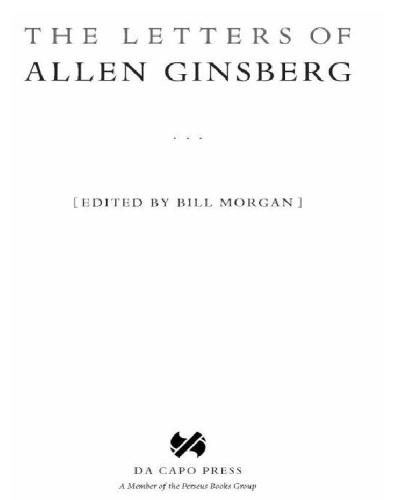
The Letters of Allen Ginsberg
کتاب های مرتبط
- اطلاعات
- نقد و بررسی
- دیدگاه کاربران
نقد و بررسی

June 30, 2008
In 1962 Allen Ginsberg wrote to Bertrand Russell: “All I know is, I've lived in the midst of apparent worldly events and apparent transcendental insights, and it all adds up to I don't know what.” Both the worldliness and the transcendence come through in these letters by the beat poet, published for the first time. As the poet's biographer and prolific literary archivist, Morgan has selected just 165 out of more than 3,700 letters. They offer a comprehensive look at Ginsberg's life, from his earliest letter to the New York Times
in 1941 to his dying message to Bill Clinton requesting an arts prize “unless it's politically inadvisable or inexpedient.” Ginsberg wrote at length to just about anyone: Kerouac and other literary colleagues, of course, but also journalists and literary critics who failed (in his estimation) to fully appreciate what the beats had accomplished. The playful, experimental side of his personality comes through, from his youthful attempts to attract the attention of Ezra Pound to his experiments with LSD. Ginsberg's admirers will be glad Morgan has followed the poet's instructions not to “smooth out rough horny communist un-American goofy edges.”

September 1, 2008
Morgan, Ginsberg's biographer "(I Celebrate Myself)" and archivist, studied 3700 letters left behind by the poet, selecting 165 of the most significant for this edition; over 125 appear here for the first time. Always intelligent, sometimes gossipy, and occasionally cranky and impatient, Ginsberg is accurately reflected in these letters taken together. Correspondents include Ginsberg's father, Louis, and brother, Eugene; the poet's longtime companion, Peter Orlovsky; fellow Beat writers Jack Kerouac, William Burroughs, and Gregory Corso; and a host of friends and acquaintances. There are also letters to newspapers and politicians, ranging from one on the League of Nations sent to the New York Times in 1941 to a short note to President Bill Clinton seeking "some sort of an award or medal," written just days before Ginsberg's death. Arranging the letters chronologically, Morgan uses headnotes to identify correspondents and provide additional context as needed. On the whole, his quest to compile "a greatest hits album" of Ginsberg's correspondence succeeds admirably. Highly recommended for all literature collections.William Gargan, Brooklyn Coll. Lib., CUNY
Copyright 2008 Library Journal, LLC Used with permission.

























دیدگاه کاربران